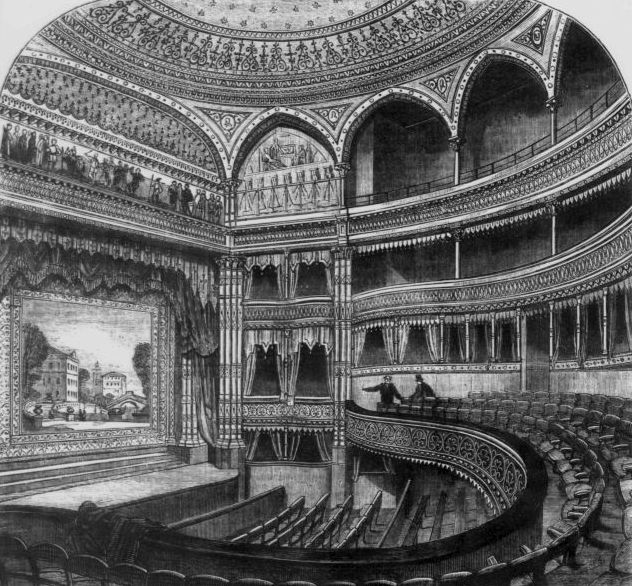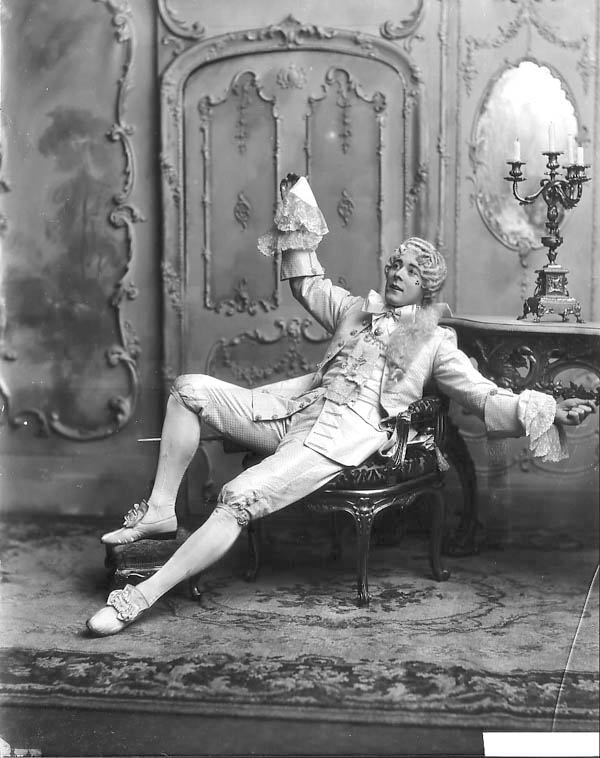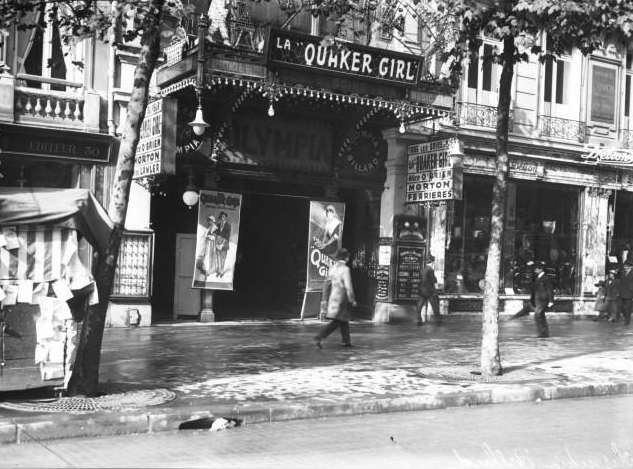|
Julia James
Julia James (1890–1964) was an English actress of the 1900s Edwardian era, the leading lady at the Gaiety Theatre. Biography Julia James was born in London in 1890. In 1905 she began her career in ''Supper Belle in Blue Bell'' at the Aldwych Theatre under Seymour Hicks. She was the leading lady at the Gaiety Theatre, appearing in ''The Girls of Gottenburg'', ''Havana'', and ''Our Miss Gibbs''. In 1913 she had the role of Sombra in '' The Arcadians'' at L'Olympia The Olympia (; commonly known as L'Olympia or in the English-speaking world as Olympia Hall) is a concert venue in the 9th arrondissement of Paris, 9th arrondissement of Paris, France, located at 28 Boulevard des Capucines, equally distancing La ..., Paris. In 1916 she performed at the London Opera House in '' Christmas in the Trenches''. In 1919 she played as Mabel Mannering in '' Yes, Uncle!''. She died in 1964. References {{DEFAULTSORT:James, Julia 1890 births 1964 deaths Actresses from London ... [...More Info...] [...Related Items...] OR: [Wikipedia] [Google] [Baidu] |
Julia James By Bassano Ltd 1914
Julia is usually a feminine given name. It is a Latinate feminine form of the name Julio and Julius. (For further details on etymology, see the Wiktionary entry "Julius".) The given name ''Julia'' had been in use throughout Late Antiquity (e.g. Julia of Corsica) but became rare during the Middle Ages, and was revived only with the Italian Renaissance. It became common in the English-speaking world only in the 18th century. Today, it is frequently used throughout the world. Statistics Julia was the 10th most popular name for girls born in the United States in 2007 and the 88th most popular name for women in the 1990 census there. It has been among the top 150 names given to girls in the United States for the past 100 years. It was the 89th most popular name for girls born in England and Wales in 2007; the 94th most popular name for girls born in Scotland in 2007; the 13th most popular name for girls born in Spain in 2006; the 5th most popular name for girls born in Sweden ... [...More Info...] [...Related Items...] OR: [Wikipedia] [Google] [Baidu] |
Gaiety Theatre, London
The Gaiety Theatre was a West End theatre in London, located on Aldwych at the eastern end of the Strand. The theatre was first established as the Strand Musick Hall in 1864 on the former site of the Lyceum Theatre. In 1868, it became known as the Gaiety Theatre and was, at first, known for music hall and then for musical burlesque, pantomime and operetta performances. From 1868 to the 1890s, it had a major influence on the development of modern musical comedy. Under the management of John Hollingshead until 1886, the theatre had early success with ''Robert the Devil'', by W. S. Gilbert, followed by many other burlesques of operas and literary works. Many of the productions starred Nellie Farren. Hollingshead's last production at the theatre was the burlesque '' Little Jack Sheppard'' (1885–86), produced together with his successor, George Edwardes. Edwardes's first show, '' Dorothy'', became a long-running hit. In the 1880s and 90s, the theatre had further succes ... [...More Info...] [...Related Items...] OR: [Wikipedia] [Google] [Baidu] |
Supper Belle In Blue Bell
Supper was originally a secondary lighter evening meal. The main meal of the day, called dinner, used to be served closer to what is known as lunchtime, around the middle of the day, but crept later over the centuries, mostly over the course of the 19th century. When dinner was still at the early time, eating a lighter supper in the evening was very common; it was not always the last meal of the day, as there might be a tea later. Reflecting the typical custom of 17th century elites, Louis XIV dined at noon, with a supper at 10p.m. Even when dinner was in the early evening, supper was served at a ball, or after returning from it, and might be after other evening excursions. At an English ball in 1791, supper was served to 140 guests at 1:00 a.m. They would all have had dinner at home many hours earlier, before coming out. Other, grander, balls served supper even later, up to 3:30 a.m., at a London ball given in 1811 by the Duchess of Bedford. The modern usage of "supper" v ... [...More Info...] [...Related Items...] OR: [Wikipedia] [Google] [Baidu] |
Aldwych Theatre
The Aldwych Theatre is a West End theatre, located in Aldwych in the City of Westminster, central London. It was listed Grade II on 20 July 1971. Its seating capacity is 1,200 on three levels. History Origins The theatre was constructed in the newly built Aldwych as a pair with the Waldorf Theatre, now known as the Novello Theatre. Both buildings were designed in the Edwardian Baroque style by W. G. R. Sprague. The Aldwych Theatre was funded by Seymour Hicks in association with the American impresario Charles Frohman, and built by Walter Wallis of Balham. The theatre opened on 23 December 1905 with a production of ''Blue Bell'', a new version of Hicks's popular pantomime ''Bluebell in Fairyland''. In 1906, Hicks's '' The Beauty of Bath'', followed in 1907 by '' The Gay Gordons'', played at the theatre. In February 1913, the theatre was used by Serge Diaghilev and Vaslav Nijinsky for the first rehearsals of '' Le Sacre du Printemps'' before its première in Paris during M ... [...More Info...] [...Related Items...] OR: [Wikipedia] [Google] [Baidu] |
Seymour Hicks
Sir Edward Seymour Hicks (30 January 1871 – 6 April 1949), better known as Seymour Hicks, was a British actor, music hall performer, playwright, actor-manager and producer. He became known, early in his career, for writing, starring in and producing Edwardian musical comedy, often together with his famous wife, Ellaline Terriss. His most famous acting role was that of Ebenezer Scrooge in Charles Dickens's '' A Christmas Carol''. Making his stage début at the age of nine and performing professionally by sixteen, Hicks joined a theatrical company and toured America before starring in ''Under the Clock'' in 1893, the first musical revue ever staged in London. Following this, he starred in a revival of '' Little Jack Sheppard'' at the Gaiety Theatre, London which brought him to the attention of impresario George Edwardes. Edwardes cast Hicks in his next show, '' The Shop Girl'', in 1894. Its success led to his participation in two more of Edwardes's hit "girl" musicals, '' T ... [...More Info...] [...Related Items...] OR: [Wikipedia] [Google] [Baidu] |
The Girls Of Gottenburg
''The'' () is a grammatical article in English, denoting persons or things that are already or about to be mentioned, under discussion, implied or otherwise presumed familiar to listeners, readers, or speakers. It is the definite article in English. ''The'' is the most frequently used word in the English language; studies and analyses of texts have found it to account for seven percent of all printed English-language words. It is derived from gendered articles in Old English which combined in Middle English and now has a single form used with nouns of any gender. The word can be used with both singular and plural nouns, and with a noun that starts with any letter. This is different from many other languages, which have different forms of the definite article for different genders or numbers. Pronunciation In most dialects, "the" is pronounced as (with the voiced dental fricative followed by a schwa) when followed by a consonant sound, and as (homophone of the archaic pr ... [...More Info...] [...Related Items...] OR: [Wikipedia] [Google] [Baidu] |
Havana (Edwardian Musical)
''Havana'' is an Edwardian musical comedy in three acts, with a book by George Grossmith, Jr. and Graham Hill, music by Leslie Stuart, lyrics by Adrian Ross and additional lyrics by George Arthurs. It premiered on 25 April 1908 at the Gaiety Theatre, London, starring Evie Greene as Consuelo, W. H. Berry as Reginald Brown, Lawrence Grossmith as Don Adolfo and Mabel Russell as Pepita.Cast and productions details at '''' website (1902–1910) of the Templeman Library at the University of Kent at Canterbury A young [...More Info...] [...Related Items...] OR: [Wikipedia] [Google] [Baidu] |
Our Miss Gibbs
''Our Miss Gibbs'' is an Edwardian musical comedy in two acts by 'Cryptos' and James T. Tanner, with lyrics by Adrian Ross and Percy Greenbank, music by Ivan Caryll and Lionel Monckton. Produced by George Edwardes, it opened at the Gaiety Theatre, London, Gaiety Theatre in London on 23 January 1909 and ran for an extremely successful 636 performances. It starred Gertie Millar, Edmund Payne and George Grossmith, Jr. The young Gladys Cooper played the small role of Lady Connie. The show also had a short Broadway theatre, Broadway run in 1910. It was revived at the Finborough Theatre, London, in May 2006. This was the first professional London production since 1910. The piece was regularly revived by amateur theatre groups, particularly in Britain, from the 1920s into the 1950s but it has been produced only rarely since then.Bond, Ian"Rarely Produced Shows". St. David's Players, accessed 22 July 2010 ''Our Miss Gibbs'' was revived by the Lyric Theatre in July and August 2011 a ... [...More Info...] [...Related Items...] OR: [Wikipedia] [Google] [Baidu] |
The Arcadians (musical)
''The Arcadians'' is an Edwardian musical comedy styled a "Fantastic Musical Play" in three acts with a book by Mark Ambient and Alexander M. Thompson, lyrics by Arthur Wimperis, and music by Lionel Monckton and Howard Talbot. The story concerns some idyllic Arcadia (utopia), Arcadians who wish to transform wicked London to a land of truth and simplicity. First produced by Robert Courtneidge, the musical opened at the Original Shaftesbury Theatre, Shaftesbury Theatre in London, on 29 April 1909, and ran for 809 performances. This was the third longest run for any musical theatre piece up to that time. The production starred Phyllis Dare, Dan Rolyat and Florence Smithson. A Broadway production opened in 1910 and ran for 193 performances, and the piece was toured extensively, and revived professionally, in Britain. A silent film version was made in 1927, and the piece was popular with amateur theatre groups, particularly in Britain, through the 20th century. Recordings of some of ... [...More Info...] [...Related Items...] OR: [Wikipedia] [Google] [Baidu] |
L'Olympia
The Olympia (; commonly known as L'Olympia or in the English-speaking world as Olympia Hall) is a concert venue in the 9th arrondissement of Paris, 9th arrondissement of Paris, France, located at 28 Boulevard des Capucines, equally distancing La Madeleine, Paris, Madeleine church and Palais Garnier, Opéra Garnier, north of Place Vendôme, Vendôme square. Its closest métro/RER stations are Madeleine (Paris Métro), Madeleine, Opéra (Paris Métro), Opéra, Havre – Caumartin (Paris Métro), Havre – Caumartin, and Auber (Paris RER), Auber. The hall was opened in 1893 by one of the two co-creators of the Moulin Rouge venue, and saw many opera, ballet, and music hall performances. Theatrical performances declined in the late 1920s and the Olympia was converted into a cinema, before re-opening as a venue in 1954 with Bruno Coquatrix as executive director. Since the 1960s, it has been a popular venue for rock bands. The Olympia was threatened with demolition in the early 1990s, ... [...More Info...] [...Related Items...] OR: [Wikipedia] [Google] [Baidu] |
London Opera House
London is the capital and List of urban areas in the United Kingdom, largest city of England and the United Kingdom, with a population of just under 9 million. It stands on the River Thames in south-east England at the head of a estuary down to the North Sea, and has been a major settlement for two millennia. The City of London, its ancient core and financial centre, was founded by the Roman Empire, Romans as ''Londinium'' and retains its medieval boundaries.See also: Independent city#National capitals, Independent city § National capitals The City of Westminster, to the west of the City of London, has for centuries hosted the national Government of the United Kingdom, government and Parliament of the United Kingdom, parliament. Since the 19th century, the name "London" has also referred to the metropolis around this core, historically split between the Counties of England, counties of Middlesex, Essex, Surrey, Kent, and Hertfordshire, which largely comprises Greater London ... [...More Info...] [...Related Items...] OR: [Wikipedia] [Google] [Baidu] |
Christmas In The Trenches
"Christmas in the Trenches" is a ballad from John McCutcheon's 1984 album ''Winter Solstice''. It tells the story of the 1914 Christmas Truce between the British and German lines on the Western Front during the Great War from the perspective of a fictional British soldier. Although Francis Tolliver is a fictional character, the event depicted in the ballad is true. McCutcheon met some of the German soldiers involved in this Christmas story when he toured in Denmark. Concept The ballad is a first person narrative by Francis Tolliver, a fictional British soldier from Liverpool. He is relating the events that happened two years prior, while he was a soldier in the trenches of the Great War. He and his fellow soldiers are dug into their trench, where, as Tolliver relates, "the frost so bitter hung," while their German enemies occupy the trench at the opposite end of No Man's Land. The scene is one of quiet and cold; "the frozen fields of France were still; no songs of peace were s ... [...More Info...] [...Related Items...] OR: [Wikipedia] [Google] [Baidu] |





.png)
_1909.jpg)
